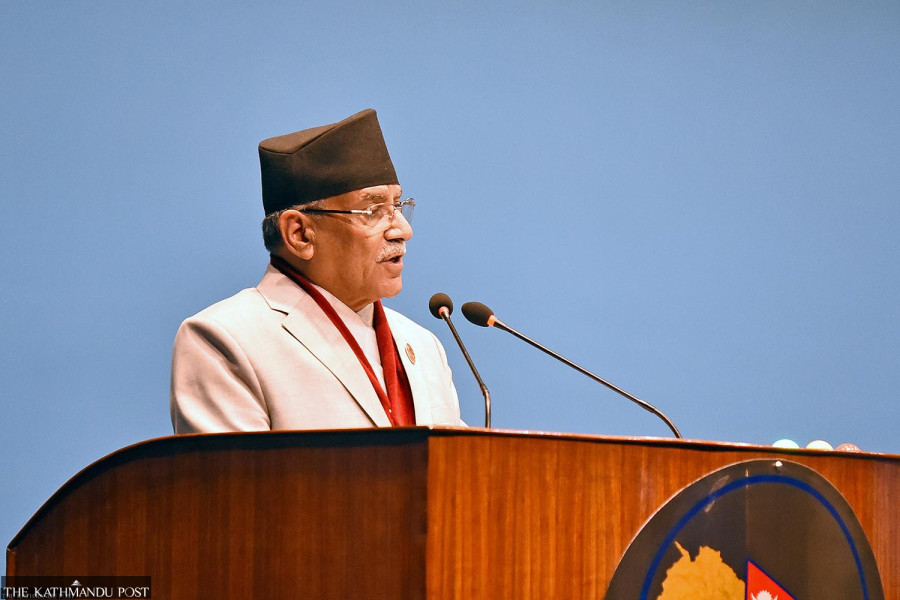Money
NEPSE dives as Dahal scores rousing win in floor test
The stock market index plunged by 21.34 points on Tuesday, astounding market watchers.
Sangam Prasain & Krishana Prasain
Stocks tumbled after Prime Minister Pushpa Kamal Dahal won a vote of confidence in Parliament on Tuesday over concerns that lack of a credible opposition could weaken democracy.
The NEPSE had been flying high for almost two weeks before sliding into negative territory on news that the Nepali Congress too had decided to side with Dahal.
The newly elected prime minister received 268 votes in the floor test in the 275-member Parliament, with only two votes against, which observers described as shaky politics because there is virtually no opposition now.
“For the second time in Nepal’s history, there is no opposition,” said political analyst Vijay Kant Karna. “If there is no opposition, democracy is not healthy. If democracy is not healthy, how can the government fulfil the people’s aspirations?”
Speaking to lawmakers before the vote, Dahal “guaranteed” that the government henceforth would not disappoint farmers who have been suffering constantly due to one or the other reason.
“Farmers will get chemical fertiliser. We will also construct a fertiliser plant,” Dahal said.
He also pledged that Nepal’s dependency on fossil fuels would be slashed. “We will have 6,500 megawatts of electricity within five years,” said Dahal, adding that electricity would reach the entire population before the year was out.
The government has announced providing, without charge, 50 units of electricity in the summer and 30 units in the winter to poor households and marginalised communities.
“The social security scheme will cover 6 million people within five years,” said Dahal. He said that a transport board would be set up to reduce road accidents. “The country has not honoured the people who send remittance home. I promise that I will change the system.”
A Nepal Stock Exchange official said that the bullish trend that followed the formation of a new government was not a coincidence. But then the NEPSE plunged by 21.34 points on Tuesday, astounding market watchers.
“Investors were hopeful that the new government would address the economy,” said NEPSE officials.
The new government has said that it is concerned about the capital market where tens of thousands of Nepalis have invested their hard-earned money.
“Nepal Rastra Bank, the country’s central bank, has made an amendment in the Working Capital Loan guideline, and it seems that liquidity is increasing among banks,” said Shekhar Golchha, president of the Federation of Nepalese Chambers of Commerce and Industry.
“There are some signs that interest rates will fall soon. This has enthused the private sector. Following the formation of a new government, the stock market had shown a positive indication,” he added.
Nepal’s ailing economy was affected severely immediately after the Covid pandemic. The Russia-Ukraine war and then global inflation impacted the economy. The erstwhile government had introduced strict measures to tame inflation and stop foreign currency outflow.
On April 26, 2022, the government embargoed 10 types of goods described as luxury items. They included, among other things, mobile sets worth over $600 and motorcycles of over 250 cc capacity.
Harsher restrictions followed, and mobile sets costing more than $300 and motorcycles with a capacity of more than 150 cc were banned. The import restrictions were lifted on December 6, but not before repercussions had spread through the market.
The government’s revenue collection fell short of the target by over Rs120 billion in the first six months of the current fiscal year, according to customs officials.
The prime minister along with Finance Minister Bishnu Prasad Paudel met with representatives of the private sector and assured them that the government would address the grievances of the business community.
“The economy is still in trouble. There is a lot to be done to increase market confidence,” said Golchha.
Immediately, after the formation of the new government, Nepal Oil Corporation decided to reduce fuel prices.
Last November, the private sector had warned that the economic crisis could deepen, and blamed external factors—a rise in prices of fuel and raw materials—for the problem.
Birendra Raj Pandey, vice-president of the Confederation of Nepalese Industries, said that the capital market was being corrected.
“But we see it as transitory. The problem lies in the core policies and the decision-making process of the government. The government needs to be clear on prioritising economic policy.”
The first cabinet decision of the incumbent government was economic reform. “But this commitment needs to be translated into action,” Pandey said.
Economists say that the new government has started out on a positive note. But how far they will go to address all the issues is questionable and debatable, they say.
“Amending the Working Capital Loans guideline is a welcome move,” said economist Govinda Nepal. “The way the new government has started has made the private sector hopeful to some extent. But it’s too early to cheer.”
Nepal said that the private sector had stopped its protest against the sharp hike in bank interest rates. “The finance minister is accessible to the private sector,” he said.
“There are signs that the interest rate will decline as the interbank interest rate has decreased by around 2 percent. These attempts show some hope, but the economic problems remain as they are. There is no way of increasing exports immediately,” he said.
According to analysts, imports may increase and cause the trade deficit to widen further. Remittance is still coming through illegal channels, and migrant workers are leaving the country in droves due to lack of employment opportunities at home.
The manufacturing sector is still operating at minimum capacity, especially the construction sector, and inflation is another headache.
"The common minimum programme released by the government has mentioned that the economy is in trouble, but no solution has been presented," said economist Nepal.




 13.03°C Kathmandu
13.03°C Kathmandu














